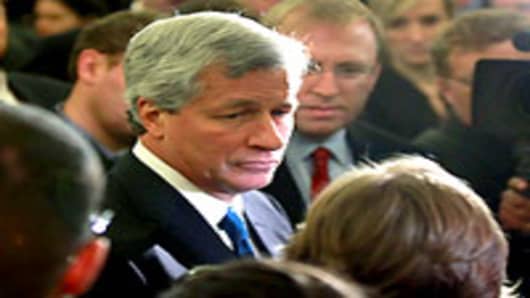In a groundbreaking move, JPMorgan is the first major company to claw back pay from senior executives linked to the nearly $6 billion dollars in trading losses at its Chief Investment Office.
“I think the fact they did it is significant,” said Professor Charles Elson of the University of Delaware.
Elson, a leading expert on corporate governance added, “I think they are certainly making their point. If those [trading] returns are not produced or they are false returns they [JPMorgan] are certainly entitled to ask for it back.”
Compensation and governance experts say JPMorgan’s actions may now be used as a template by other Wall Street firms looking to recoup pay from employees.
“It’s no longer heads I win, tails I win,” said Elson when asked if the clawbacks would serve as a deterrent to other traders considering risky bets.
“I think the fact that JPMorgan is publicly announcing an implementation of its clawback policy is a major step in the right direction,” said Kenneth Feinberg, an attorney with Feinberg Rozen.
Feinberg, who also serve as the Troubled Asset Relief Progam’s (TARP) Special Master for Executive Compensation noted JPMorgan is the first firm that is not a ward of the government to clawback pay from senior executives.
AIG did it, recouping pay from current and former executives at its Financial Product unit, the group responsible for the near collapse of the insurance giant. But at the time of the clawback, Feinberg points out the government was the majority owner of AIG.
“This has shaken our company to the core,” JPMorgan’s CEO Jamie Dimon said on a conference callwith analysts where the bank outlined the problems that lead to the trading losses, problems that included weak oversight and poor risk management. The bank says these clawbacks are the maximum allowed under its employment agreements.
In light of the losses the bank is clawing back — that is taking back previous compensation —what is close to two years pay from three former managers at the CIO.
The persons impacted are Achilles Macris, Javier Martin-Artajo and Bruno Iksil, known as “the Whale” for the outsized trades made in the credit derivatives markets. As for Ina Drew, the former chief of the CIO who retired in May, Dimon said she voluntarily gave up past pay.
“In my experience she has acted with integrity and tried to do what was right for the company at all times even though she was part of this mistake,” Dimon said on the call. “And I believe that’s true here as well. In that spirit Ina came forward and offered to give up a very significant amount of her past compensation, which is equivalent to the maximum clawback amount."
In 2011, Drew was one of JPMorgan’s five highest paid executives pulling down $15.1 million dollars.
The pay that is being clawed back includes restricted stock and option grants. The fact is this type of pay is being recouped was not unexpected.
For tax purposes and from a legal perspective, it is easier to cancel grants or take back restricted stock than it is to try to get employees to return cash that has been deposited in an account or used to pay for a house or car. JPMorgan’s actions are bringing cautious praise from some members of the governance community.
In an email to CNBC, Eleanor Bloxham of the Value Alliance and Corporate Governance Alliance wrote, “"The clawbacks are substantial. I think the board should have been more out front on a clawback for Jamie and the CFO — and perhaps an internal audit.”
Since the trading losses were first disclosed in May, the bank has said it would consider clawing back pay. It is a decision that will be dissected on Wall Street where some banks have clawed back pay from more junior members, but where such actions are not disclosed publicly and have not yet impacted people of Drew’s seniority.
There had been speculation the Dimon might forfeit some pay given he has said the CIO losses were a reflection of poor oversight.
In an interview with CNBC last month Dimon said any decision on his compensation would be made by the board.
During the call Mike Cavanagh, the bank’s CEO of Treasury and Securities Services who was charged with conducting the internal investigation into the losses, said any decisions about other clawbacks will be made during the course of business this year and would reflect an individual’s involvement with CIO among other factors.
Robin Ferracone, Chairman of the compensation consultant Farient Advisors questions why the bank did not announce it was clawing back pay of some members of senior management.
Ferracone pointed out that the banks own clawback policy states pay should be clawed back if members of the operating committee failed to identify risks that were material to the company. Because of the trading losses, the bank restated its first quarter earnings, a fact she said should triggered a clawback under the bank’s rules.
-By CNBC's Mary Thompson
@MThompsonCNBC
This post has been updated.



